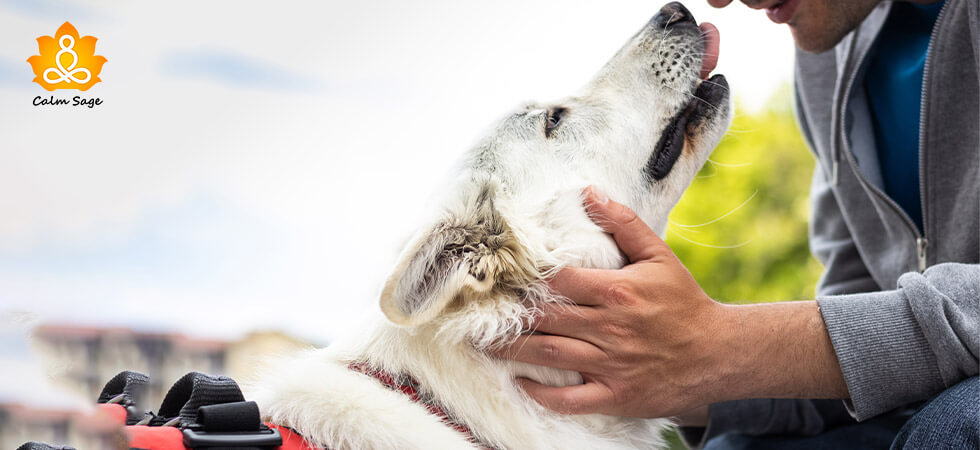Pawsitive Power: The Benefits of Service Dogs For Depression

Depression can be relentless, casting a dark shadow on almost every aspect of your life. This mental health condition affects millions of people, impacting not only their mental and emotional, but physical health as well. While traditional treatment approaches such as talk therapy and medication play a role in managing depression symptoms, some people find comfort and support in their fur babies or what we can call service dogs.
Pets – whether you believe it or not – have an incredible power to connect with their humans on an emotional level. Their companionship can bring us comfort and joy, as well as provide a sense of purpose. If you’re struggling with depression, then just the presence of a loving pet can offer you much-needed support.
The therapeutic benefits of animal companionship are well-researched and documented. It is a known fact that spending time with animals can reduce stress, anxiety, and feelings of loneliness. Whether it’s cuddling with your cat or playing “go fetch” with your dog, the connection between humans and animals can work wonders on one’s mental health.
But, where do service dogs for depression come in? Can they work for everyone with depression? Are you eligible to apply for one? Let’s answer these questions in this article!
Service Dogs For Depression
Service dogs for depression are specially-trained canines that can assist people with managing their depression symptoms. Unlike pets or emotional support animals, service dogs or psychiatric service dogs are trained to perform specific tasks that help their owners cope with the many challenges that accompany depression.
While the effectiveness of psychiatric service dogs for depression varies from person to person, many people have reported improved changes in their symptoms after getting a service dog. The comfort and support of a trained furry friend can offer the emotional support you need, motivation to get going, and a sense of security.
What Do Service Dogs Do For Depression?
Service dogs for depression are trained to perform different tasks that are often tailored to their owner’s needs. These tasks may include;
- Giving deep pressure therapy by leaning against or lying on top of their owner to ease anxiety
- Alerting their owners to signs of an impending panic or anxiety attack, or even a depressive episode
- Encouraging their owners to engage in play therapy or outdoor exposure by prompting them to go for walks or playing with them
- Offering support and companionship during times of distress
The Benefits of a Service Dog For Depression
Despite psychiatric service dogs being different from emotional support animals, they do offer benefits. Here are some benefits of a service dog for depression;
- Service dogs offer constant companionship and emotional support, reducing feelings of loneliness and isolation
- Having a service dog can encourage owners to engage in physical activity, which can help reduce the symptoms of depression and anxiety
- Caring for a service dog can provide a sense of purpose and responsibility to the owner, boosting feelings of self-worth and accomplishment
- Service dogs can also be a catalyst for social interaction, helping their owners connect with other people and engage in social activities
- Having the calm support of a service dog can help reduce anxiety and promote relaxation
- Service dogs can also assist their owners with their daily tasks, increasing their independence and confidence as time goes on
How to Get a Service Dog For Depression?
Getting a service dog for depression or even anxiety might involve several steps – legal and emotional.
1. Figure out your needs:
The first thing you need to do before you get a service dog for depression is to understand your need for one. See how a service dog can benefit you and what tasks you need help with.
2. Research about them:
Research all reputable service dog organizations and trainers that specialize in training service dogs for mental health needs.
3. Apply for one:
Now, after these steps, you need to apply to the chosen organization or trainer, detailing your needs and circumstances. Here, you need to cooperate with the process, so be patient.
4. Undergo an evaluation:
The organization or trainer might want you to undergo a psych evaluation to assess your suitability for a service dog and to match you with an appropriate breed.
5. Go for training:
Once you’re matched with a service dog, participate in the training sessions with your service dog to learn how to communicate with them and work with them, as a team.
6. Allow for a smooth transition:
Once the training is complete, integrate your service dog into your daily routine and continue to work with your dog in their training and how they can help your needs.
Related: Is Cynophobia (The Fear Of Dogs) A Real Phobia?
Is a Service Dog the Same as an Emotional Support Animal?
I’ve seen people often get confused between a service dog and an emotional support animal. It’s important to understand the difference between an ESA and a psychiatric service dog.
While both can offer emotional support, service dogs are trained to perform specific tasks that assist people with disabilities, including mental health conditions like depression, anxiety, autism, etc.
Emotional support animals (ESAs) do not require specific training and are not granted the same legal rights as psychiatric service dogs.
Am I Eligible For a Service Dog?
The eligibility criteria for getting a service dog for depression can vary – depending on the organization offering one or the trainer under whom the dog is being trained. Generally, you need to;
Have a diagnosed mental health condition such as depression
Demonstrate a need for assistance with specific tasks that are related to your condition
Be capable enough to care for and manage the service dogs’ needs responsibly
Coping With Depression
Apart from service dogs, there are other ways to cope with depression. Some can include;
- Therapy such as cognitive-behavioral therapy, counseling, etc.
- Medications such as antidepressants as prescribed by a healthcare professional
- Joining support groups for depression where you can connect with others with the same condition, get support, and learn coping strategies from them
- Changing your lifestyle, prioritizing self-care, eating balanced meals, getting physical exercise, sleeping well, and avoiding substances such as drugs and alcohol
- Practicing techniques such as mindfulness, meditation, deep breathing, and progressive muscle relaxation (PMR) to cope with depressive symptoms
Getting Help For Depression…
You need to understand that you’re not alone in your depression. It’s OK to seek help from a therapist or a counselor if you’re experiencing symptoms of depression that interfere with your daily life. Common signs of depression can include;
- Persistent feelings of sadness and hopelessness
- Loss of interest in activities you once enjoyed
- Changes in appetite and sleeping patterns
- Difficulty making decisions or concentrating on tasks
If you or a loved one of yours is experiencing these symptoms for more than two weeks, then you need to connect with a mental healthcare professional for help. A therapist can help you understand the causes and come up with a treatment plan to treat and cope with depression.
Reach Out To A Professional TODAY!
Wrap Up…
Service dogs can be valuable companions and support for people with depression. These furry friends can offer unconditional love, support, and assistance with managing depression symptoms. While getting a service dog for depression might not cure your condition at once, service dogs can significantly enhance the quality of life.
If you’re considering getting a service dog for depression, then research your options, assess your needs, and consult professionals to find the best course of action. Remember, you’re not alone, and help is just around the corner. All you need to do is ask!
I hope this article helped you understand what service dogs are and how a service dog for depression can be helpful. Let us know your thoughts about the article in the comments below.
Take Care!




















